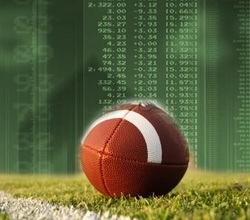
Fantasy Football Origin and History
The history of Fantasy Football. actually began several years before the first fantasy team was selected. Although the exact details seem to differ according to who is telling the story, there is no doubt that it was one Wilfred Winkenbach that first had the idea of a fantasy sport, wherein participants would formulate their own teams and determine the success or otherwise of these teams by means of the statistics of the individual team members.
Golf Came First!
In fact, it was not football but golf that was the first sport to be played under fantasy rules. Wilfred Winkenbach devised fantasy golf in the latter part of the 1950s, in which each player selected a team of professional golfers and the person with the lowest combined total of stokes at the end of the tournament would win. Golf is a simple fantasy game to administer and keep tabs on, since you are concerned only with the scores of your team members without anything else to complicate it.
As with many breakthrough ideas, the concept was simple and it was extended to baseball before Winkenbach had the idea of fantasy football. This was not surprising, since he was part owner of Oakland Raiders at the time - in fact, what WAS surprising was that he developed fantasy golf and baseball before fantasy football! The football idea came to him on a wet October evening in 1962, when he discussed his idea with the Oakland Raiders PR man Bill Tunnell and the Oakland Tribune sports journalist, Scotty Stirling.
Early Scoring System
They were actually spending the night in a Manhattan hotel during a Raiders' tour. The original idea was formulated into a football league comprising eight teams, and they also formulated a points scoring system somewhat different to the norm whereby 25 points were awarded for a field goal, a passing touchdown or a touchdown reception. Ten points were given for an extra point, and a massive 200 points for a kick-off, punt or pick-six. The scoring system has changed over the years, and various leagues now have their own scoring systems which offer fewer points than the above.
Once they returned to Oakland the three of them pitched their idea to George Ross, then sports editor of the Tribune. They decided that they would have to formulate a set of rules, and came up with the GOPPPL. This strange-sounding code, which was adopted in 1963, actually stood for the Greater Oakland Professional Pigskin Prognosticators League. A prognosticator is one who makes a prediction, or foretells results, which describes their activity precisely.
Fantasy Football Now
Fantasy Football simmered for a few years, although never kicked off completely until the personal computer and the internet made the gathering of statistics unbelievably simple. Prior to that, the idea was a good one, but it was not easy to carry out in practice. Teams and scores were difficult to update because you would have had to find all the statistics for each player in your team, how many rushes were made and yards gained. Not easy to do manually, but now real-time scoring is very accessible.
The internet has now made this simple, and the popularity of fantasy football has risen exponentially to the extent that it is popular throughout the entire world, and is participated in by around 20 million Americans, each with their own virtual team, and competition can be either league based, or head-to-head where you play against a specific opponent.
 RSS Feed
RSS Feed